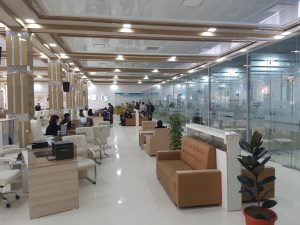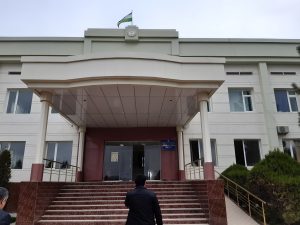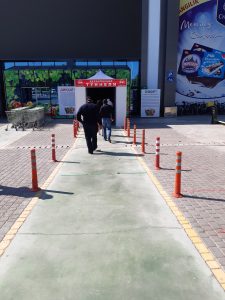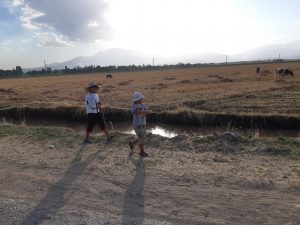Mirzokhid Karshiev, a PhD student at the University of Helsinki, was on a research trip to Uzbekistan in March-August 2020. His field trip was supported by H2020-MSCA-RISE-2018: New Markets project, funded by the European Commission.
Text and photos by Mirzokhid Karshiev
When I was planning my first research trip to Uzbekistan in December 2019, little did I know about a new virus that was seemingly disseminating in the Chinese city of Wuhan. What I was preoccupied with was planning ahead two full months of meetings, interviews, participant observation, visits to various regions of the country.
After getting necessary approvals from my supervisors, in January 2020 I booked my tickets to my destination, opting for only train travel from Helsinki to Termez, a city in the south of my Uzbekistan. February was my last full month at office, where I would, inter alia, follow the news about the spread of the virus from China to other parts of the world. Still, one could count the number of new daily infections in Finland on one hand, and no covid-19 infections being reported in Uzbekistan.
International travel in times of the covid-19
Equipped with facemasks and hand sanitisers, I left Helsinki on 8 March, taking a fast-speed “Allegro” train from the city to Saint Petersburg (Russia) and from there to Moscow on a comfortable “Sapsan”. By the end of the day, I was on board a soviet-style Moscow-Tashkent train at the Kazanskiy station with my family, who joined me in this trip with plans to return to Helsinki in two weeks. We felt safer that we didn’t have to share our cabin with anyone and decided not to eat at the train restaurant. The train was almost empty. “It is predominantly used by seasonal migrants from Uzbekistan and in this time of the year the movement is usually to Russia not the other way round”, explained the train conductor, who had his face mask on. Colourful bulletins with instructions on covid-19 were hung around the train cars.
We crossed several countries and borders during our train trip. On Russia-Kazakhstan border, a Kazakh border guard took an interest in my recent travels through checking the stamps in my passport. I explained to him that since not all border passes are stamped into the passport, especially in the European Union, where I am traveling from, it might be a better idea if I would tell or write to him about my recent international travel destinations. He shrugged this off without any interest. As in many post-soviet countries, for him and his superiors, documents spoke louder than words.

Aktobe train station, March 2020
In two hours after we crossed the border, the train arrived in Aktobe, where a doctor was waiting for me at the train station. When the conductor directed her to my way, I couldn’t help noticing that she hastily put on her mask. She said that a couple days earlier, there was the first covid-19 case in Azerbaijan and she was summoned by the border guards from her work at a city health clinic to examine me. “I was said that you were in Azerbaijan in February. Even if you visited the country 20 days before, we have to be careful”, she continued. She asked me if I was in contact with other passengers in the train or if I had a fever recently. After finding out that I did not, she requested to continue my journey with safety precautions. I had no reason not to take her words seriously, besides, my mother, who occupied a similar position in a local clinic in Uzbekistan, told about similar sorts of things they do at the request of local and national authorities. Was it worth her 2 hours of work time to spend on me at the orders of the border guard and could this process be organized in a different, more efficient way? My research also partially tries to answer such questions through contextualising “the state” in local settings and trying to understand it through everyday interactions of local officials and street-level bureaucrats.
On 11 March, the day WHO characterised COVID-19 as a pandemic, our train crossed the Kazakh-Uzbek border. We were made to wait 4 hours in total on each side of the border. “This is a usual thing, not anyhow related to the covid-19 situation”, said our conductor, pointing towards the train schedule.
Access to the field
As a citizen of Uzbekistan, who has spent majority of his life in the country, I was better equipped to deal with the usual list of issues, faced by foreign researchers when visiting field sites for the first time. Uzbekistan has also made research visits significantly easier since 2016, after the new president took over the leadership of the country.
Besides, I was fortunate enough to enjoy support through several channels- the “New Markets” project had a local partner, which happened to be my alma mater-the University of World Economy and Diplomacy in Tashkent. I also agreed with the local office of the United Nations Development Program to accompany them in their project activities, related to the analysis of public advisory councils in the regions. I could also see the benefits of “a snowball effect”, with one interview leading to another, but many people could be approached without prior introduction. Sometimes, you just have to write to them via Facebook. Of course, my previous work experience in Uzbekistan provided me with a big pool of organizations and individuals that I could tap into, but I tried to avoid “selection bias” and search out for those, who could share their original and insider knowledge of the topics, I was interested in.
Pre-pandemic field research
The next morning after I arrived in Tashkent, I took off to Gulistan (Sirdaryo region), where I had several interviews planned. I was fortunate enough to have prior agreement with the UNDP project “Improved public service delivery and enhanced governance in rural Uzbekistan”. Covid-19 was a topic of small talk during the lunch breaks, but otherwise the life was as usual for many. One of my interlocutors in a local government office said that so far the impact of covid-19 was for investment projects. “Most of our projects have stalled, even those which are not with the Chinese. We had some projects with Middle Eastern and European investors, but these also stalled because some equipment had to be procured from China, or involved Chinese experts. In any case, in many areas China has become very important”, lamented the official. Many ordinary people that I met shared, in private, different conspiracy theories (“global elite trying to control the masses”) or taking it rather philosophically (“Gods penalty to the Chinese for the plight of Uighurs”). Some joked that Uzbeks’ diet, where beef and lamb have a special place, would make us immune to the virus. Jokes aside, you could sense that most were taking it seriously. Hand sanitizers or face masks were not readily available in the pharmacies or in the market.

Public services center in Karshi. March 2020
On 15 March, I was in the southern city of Karshi, preparing for the next round of interviews. On my way there, I travelled on a high-speed “Afrosiyob” train with a group of actors and actresses from the National Theatre of Uzbekistan, headed by their director (he died of coronavirus-related complications in August). They were to take part in a regional celebration of Navruz, a national holiday, in a local park, where thousands of people were waiting for them and for popular singers, as well as holiday dishes of sumalak, osh, and ko’ksomsa. At around 2 p.m., all of a sudden the people in the park were asked to leave. Earlier that day, at a meeting in Tashkent, Prime Minister Aripov, who also headed the special anti-coronavirus commission, established in January 2020, informed about the first case of covid-19 in Uzbekistan and the decision of the Commission to close external borders, universities, schools, and kindergartens and to cancel Navruz celebrations.

Local khokimiyat (administration building) in Dehqonobod district of Kashkadarya, March 2020.
Predicting that more limitations are on the way, I decided to continue with my interviews, keeping a safe distance from my interlocutors, wearing facemasks, frequently washing my hands. The local administrations that I visited have been continuing their work in the usual manner. It was quite surreal to see in one khokimiyat a gathering of around hundred people to discuss implementation of local covid-19 response.
Immediately after the announcement, people hurried to the bazaars and shops to stockpile for the coming quarantine. On my way from Kashkadarya to Surkhandarya, I met with a fellow traveler, who said he was going to visit his ailing mom, after a profitable day. “I sold almost 10 days of potatoes in one day, even the rotten ones, for double and triple the price”, he told me.
In Surkhandarya, I decided to stay at my uncle’s place. By now, covid-19 was the dominating the media and everyday life. There were numerous briefings per day on the TV, a dedicated telegram-channel Koronavirus info had over 1,2 million new subscribers in a couple days, the special commission introduced new restrictions almost on a daily basis.
This Special commission seemed to have wide, all-encompassing powers, while at the same time, the full text of its decisions were not available. Some people whined about last-minute restrictions that significantly hampered planned activities and in some cases, exacerbated the problem, but for many, this was a necessary thing to avoid imminent crisis, and the way the “government has always operated”. My friend, who was planning to have a wedding ceremony on 24 March and invited up to 200 guests, found out on 22 March that the Commission decided to disallow all to’ys (weddings, and other big family celebrations).
At the same time, my family found out that there was no way they could return on 22 March as planned. The great uncertainty was looming as no one could tell what will happen next.
Soon I found out that inter-city trains were also cancelled, there were reports of cancellation of inter-city buses. Seeing the real possibility of being stuck in a small southern city, I hurried to make it back to Tashkent, for which I had to pay a hefty price. The taxi prices skyrocketed.
Everything has changed in ten days I was absent. The entrance to the city was turned into a fortress with soldiers and military vehicles, police officers, the National Guard and the epidemiology service people. At the block post, we were asked to come out of the car, the car was disinfected from the outside and inside, which made the driver swear privately. Apparently, he didn’t like the new smell of the car.
It was clear that I had to reconsider my plans completely.
Field research during lockdown
By April 2020, Tashkent felt completely deserted. Public transportation was banned, followed by private vehicles. Only governmental and private vehicles with a special permit were allowed to be on the streets.
Most of interviews had to be rescheduled as well as conducted through other channels. Technologically advanced interlocutors opted for Zoom, I also conducted a couple of telephone interviews. With all cafes and restaurants closed, one of my interviews took place at the bus stop. The planned presentation at the University of World Economy and Diplomacy was also conducted online, as all universities had to switch to distant education.
For many residents of Uzbekistan, though, these movement restrictions had quite devastating consequences. With up to half of workforce in the informal sector and quite heavily reliant on daily wages, many found themselves in need of financial support. The government had initially played with many options for distributing aid, but could not offer a meaningful solution as fast as they introduced the restrictions. Many community self-help groups emerged both online and offline, collecting money and food from relatively better-offs and distributing to those in need. I noted that most of the aid was targeted towards traditional “in-need” category of pensioners, the disabled, the ill and so on, while the healthy, middle-aged taxi drivers, market sellers and restaurant workers found themselves neglected. The special commission saw another, more important problem with the self-help communities that they posed an epidemiological threat.

In April, only food markets and shops were allowed to operate. They had to install disinfection tunnels and check the temperature of the visitors on entrance. Ecobazar shopping center, Tashkent. April 2020.
Surprisingly, new opportunities have also emerged for me. Some media outlets started to ask for my views and comparative analysis of responses to covid-19 in European countries and Uzbekistan. Consequently, I appeared in Kun.uz interview and wrote an article for Daryo.uz, the two giants of Uzbek internet media.
By this time, a lockdown was also introduced in Helsinki and the University of Helsinki switched to distance education and teleworking. This allowed me to continue taking part in research seminars, attend work meetings. For a Zoom meeting, it made no difference whether I was at home in Helsinki or in Tashkent.
Final remarks
In mid-May the restrictions have been significantly reduced. Many embraced this easing as a positive development as it would, at least, allow them to earn for a living. While the special commission referred to the number of dropping new infections, for many, myself included, it was the policy reversal from the strategy of “quick eradication of the virus” as the state found itself overstretched and unable to deliver most of the conditions for its success. It also demonstrated that local practices of state policy implementation matter as well as a need for more evidence-based policymaking. I would be sharing my observations and a grounded analysis on an upcoming article, tentatively titled “The Covid-19 Pandemic and its Impact on Administrative Culture and Practices in Authoritarian Regimes: A Case Study of Post-Soviet Uzbekistan”.

Boys herding cattle on the outskirts of Denov, Surkhandarya region. June 2020
